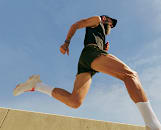
Sergey Mironov via Getty Images
How to Prep the Day Before a Marathon So It’s Your Best Race Yet
Here’s how to prepare your mind and body so you can start—and finish—your race with confidence.
By Emily Laurence•
1. Do a Shakeout Run
2. Fuel Your Body Properly
3. Hydrate
4. Lay Out Race-Day Necessities
5. Visualize Yourself Doing Well
6. Create a Pre-Race Ritual
7. Get Some Sleep
Things to Avoid the Day Before a Marathon
The Takeaway
Whether it’s your first marathon or you’ve racked up dozens of finisher medals, it’s 100-percent normal to have pre-race jitters. Months of training went into this very moment. It’s finally here. Running a marathon is physical and mental; you need both your mind and body to be ready to have a good race.
Discover more ways to reach your goals with Peloton
Many runners have pre-race rituals they abide by, whether it’s listening to a certain playlist or eating a specific meal. As running experts and a sports psychologist explain here, there’s definitely something to be said for sticking with habits you know work for you before a race. But if you’re not sure what to do the day before a marathon, consider this your step-by-step pre-race day guide. For tips on calming your nerves and doing what you can to prepare your body for the grueling run ahead, keep reading. You’ve got this!
1. Do a Shakeout Run
One or two days before your race, Peloton instructor Becs Gentry says it can be helpful to go on a shakeout run. “A shakeout run is a short run designed to shake out the nerves and possible anxiety ahead of a race. It's a slow, easy, conversational pace done one or two days before the race, depending on personal preference,” she explains.
Cassandra Padula Burke, a registered dietitian nutritionist, triathlon and running coach, and owner of Catalyst Performance Lab, also recommends doing a shakeout run one or two days before a marathon. “Think of it as a way to get some movement in your legs without going on a purposeful run,” she says. “I usually tell my athletes to do a 20- to 30-minute shakeout run the day before a race. It helps get out some nervous energy while also getting in some easy, low-key movement.”
Many marathon organizers include a shakeout run as part of the race weekend, so check your race’s website to see if one is going on. It can be a fun way to meet other runners too.

Peloton App
Access thousands of classes with no equipment needed.
2. Fuel Your Body Properly
By this point, you’ve likely already figured out how to fuel for long runs by consuming fast-digesting carbs and protein. All of that know-how is absolutely part of what to do the day before a marathon. “In actuality, the 48 hours before a marathon are the most important. You don't want to eat anything new and focus on foods that support your body in the exertion of 26.2 miles,” Becs says.
A few days before the race, Burke recommends making carbohydrates the primary focus of your meals. “This doesn’t mean carbohydrate-loading by overeating. It simply means shifting the balance of your plate to focus on carbohydrates for maximum glycogen storage,” she says. Specifically, Burke recommends that your meals be about 50 percent carbs, moderate in protein, and low in fat and fiber.
Normally, fiber-rich meals are great, but right now, you need meals that are easy for your gut to digest. “If you struggle with gastrointestinal (GI) distress, start scaling back on high-fiber foods about midweek,” Burke recommends.
The day before your race, Burke says to focus on simple carbs (not complex carbs) such as pasta, rice, pancakes, and bagels. These quick-digesting carbohydrates will give your body the easy-to-access energy it needs to sustain you for 26.2 miles.
3. Hydrate
Becs and Burke both emphasize that hydration is a big part of fueling your body properly the day before a marathon. Instead of trying to down large amounts of water in one go, Burke recommends sipping water consistently throughout the entire day before your race. If you traveled by plane to get to your race, she recommends upping your water intake by 16 to 24 ounces the day before the marathon to avoid dehydration. As a bonus, Becs also recommends adding electrolytes to your water to keep your essential mineral levels optimized.
4. Lay Out Race-Day Necessities
To avoid feeling scrambled the morning of your race, Burke recommends laying out everything you need the night before. That includes your clothes, shoes, sunscreen, bib, and any gels or goos you may be using. “I also recommend getting your breakfast items organized or packed in the refrigerator, so you won’t feel rushed on race morning,” she says.
Becs says she likes to attach her bib to her clothing so it’s ready to go and that she also double-checks any essential logistical details. “I like to ensure I know my exact route to the start and when my corral will close,” she says. “And if I'm staying in a hotel, I check on breakfast hours ahead of time. If they’re not serving anything before I’m due to set off, I’ll get to a grocery store to stock up on food I can make in my room.”
And don’t forget to charge your phone, earbuds, and smartwatch, Becs says. She recommends contacting your friends and family about a designated meeting spot in advance, just in case your phone dies while you’re running.
5. Visualize Yourself Doing Well
While taking all these steps to prepare for your marathon can help reduce pre-race anxiety, there’s more you can do to calm your mind if needed. If you’re feeling anxious, the first step is to give yourself grace and recognize that what you’re feeling is common, says Joseph Galasso, PsyD, a sports psychologist and the CEO of Baker Street Behavioral Health. Then, he recommends using a visualization practice to picture a successful race.
Burke also recommends tapping into this technique as part of race prep. “Use visualization to imagine yourself having a great race, passing other athletes, and crossing the finish line,” she says. “Remember to remind yourself that you’ve put in the training, and now it’s time to run the race and earn your bling as you celebrate crossing that finish line.”
The key to successful visualization is to ignite all your senses, Galasso says. Imagine how the crowd will sound, what it will smell like, and how your feet will feel striking the pavement with each step. Imagine yourself confidently crossing the finish line. As you go through this visualization exercise, he also recommends adding a breathing technique like box breathing, which helps to slow your heart rate and reduce anxiety. To try it, breathe in for four seconds, hold your breath (with your lungs full) for four seconds, exhale for four seconds, and then hold your breath (with your lungs empty) for four seconds.
6. Create a Pre-Race Ritual
“The best, most consistent performers have a pre-performance routine that helps them clear the noise and focus on their goals,” Galasso says. This could include going through the visualization exercise recommended above, listening to specific music, or stretching.
Becs and Burke say that cutting their toenails the night before a marathon is a pre-race ritual they do—and it’s one they recommend to others too. This can help prevent blisters or runner’s toe (when your toenail turns black). “My favorite ritual before race day is an at-home body sugar scrub. It’s relaxing and makes me feel like I just came from the spa,” Burke says.
7. Get Some Sleep
Advice from the pros: Plan for a low-key night. “Spend the evening relaxing by reading or watching a movie with friends or family. This can help you wind down and prepare for an early bedtime. That race day alarm comes awfully early,” Burke says.
A lot of runners worry about not being able to sleep before a race because of the anticipation. If you end up not sleeping as well as you wanted to, Burke says not to freak out. “It’s normal to have a restless sleep the night before a race from the excitement and nervous energy of race day. Having a poor night’s sleep the day before your race doesn’t mean you won’t race well,” she says. Even if you can’t fall asleep, she recommends staying quiet with lights off and eyes closed so you’re still allowing your body to recharge.
Really, it’s more important to prioritize sleeping well in the whole week prior to the race—if you’ve banked enough shut-eye, a bad night’s sleep right before your marathon will have less of an impact. “The sleep that really matters ahead of race day is the sleep you’ve gotten in the week leading up to the race,” Burke says.
Things to Avoid the Day Before a Marathon
What to do the day before a marathon is important, but so is knowing what not to do. When it comes to diet, avoid alcohol, fatty or fried foods, processed meats, and sugary soda. Not only can these foods and drinks cause GI problems, some (like alcohol) can be dehydrating—and that’s the opposite of what you need.
Galasso recommends avoiding caffeine and stimulants too close to bedtime so you can prepare your body to sleep well. Even if you’re worried you won’t sleep well, Becs warns against taking a sleep aid; you definitely don’t want to oversleep. Instead, she recommends reading or meditating as a way to wind down. “Ensure you have alarms set or a wake-up call if you’re in a hotel,” she adds.
The Takeaway
While it’s totally normal to have some pre-race jitters or anxiety, there’s a lot you can do to prepare both your body and mind. Fuel your body properly, lay out everything you’ll need for your race the day before, and visualize yourself doing well. “I always tell my runners to reflect on the training they’ve completed and that should calm the nerves by reassuring them that they’ve done the work. Race day is the celebration of your hard work and discipline,” Becs says.
After you cross that finish line, you can transition into marathon recovery mode. Most importantly, you get to celebrate your amazing accomplishment. (Keep in mind that the other side of the marathon-mood coin can be post-race blues; if your race high leads to feeling low, there are ways to cope with that too.) In the meantime, spend your post-race afternoon celebrating in all your favorite ways, whether it’s with pizza with friends or a long soak in the tub. You deserve it!
Related Articles

Marathon + Racing
How to Find Your Race Pace (and Use It to Crush Your PRs)

Marathon + Racing
Crush Your Next Race with These 12 Tips, From Fuel Strategies to Mindset

Nutrition
What to Eat the Night Before a Race, Whether You’re Running a 5K or a Marathon

Marathon + Racing
Here’s Your Peloton Instructor-Approved Pre Race Warm Up
This content is for informational and educational purposes only and does not constitute individualized advice. It is not intended to replace professional medical evaluation, diagnosis, or treatment. Seek the advice of your physician for questions you may have regarding your health or a medical condition. If you are having a medical emergency, call your physician or 911 immediately.
Take your runs to the next level
Lace up and enter your email to get articles, instructor tips, and updates from Peloton sent to your inbox.
By providing your email address, you agree to receive marketing communications from Peloton.
For more about how we use your information, see our Privacy Policy.









